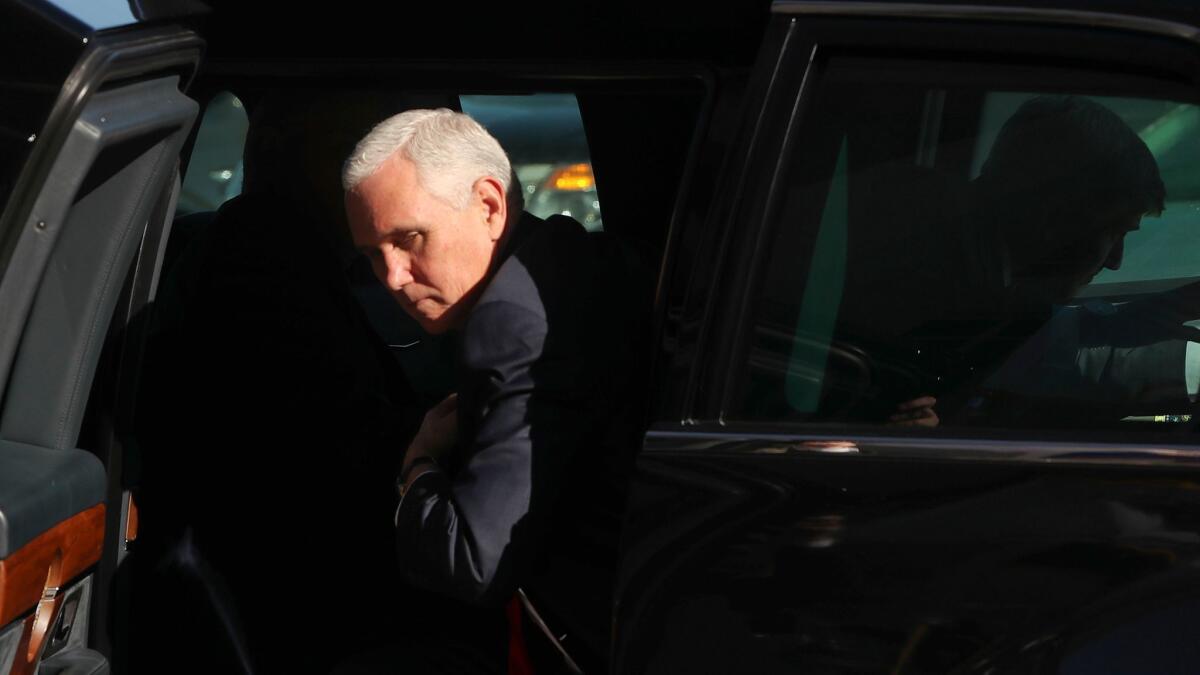Vice President Pence heads to the Middle East with prospects for peace deal all but dashed

- Share via
Reporting from Washington — Vice President Mike Pence arrives in the Middle East on Saturday, launching a high-stakes tour that was delayed after President Trump’s decision recognizing Jerusalem as Israel’s capital sparked protests across the region.
He will visit Egypt, Jordan and Israel over four days but won’t meet with Palestinians, reflecting the impasse in the Trump administration’s efforts to broker peace between them and Israel.
Those ambitious efforts ground to a halt after Trump’s decision Dec. 6 to eventually move the U.S. Embassy in Israel to Jerusalem from Tel Aviv. The president of the Palestinian Authority, Mahmoud Abbas, canceled a planned meeting with Pence in the West Bank town of Bethlehem.
Tensions flared again in advance of Pence’s trip when the administration Tuesday announced it would hold back $65 million of a planned $125-million payment to the United Nations Relief and Works Agency, which for decades has paid for medical and educational assistance to Palestinian refugees.
The White House decided Pence should depart for the trip as planned Friday night, though Congress continued to be deadlocked over funding the government. Pence was not expected to be needed to break a tie in the Republican-controlled Senate; if needed, he would make phone calls to lawmakers from the plane en route to Egypt, a White House official said.
Pence’s meetings with the leaders of the three countries “are integral to America’s national security and diplomatic objectives,” his press secretary, Alyssa Farah, said in a statement.
The vice president first will meet in Cairo with Egyptian President Abdel Fattah Sisi, the strongman Trump called “my friend” during an Oval Office meeting in April. In Amman, Jordan, Pence will confer with King Abdullah II, who had swiftly condemned Trump’s action on Jerusalem. In Israel, his last and longest stop, Pence is to meet with Prime Minister Benjamin Netanyahu.
Pence will also speak to Israeli lawmakers in the Knesset, where he is likely to receive an enthusiastic reception.
In Cairo and Amman, Pence will discuss ways to continue countering Iran’s sponsorship of terrorism, address the refugee crisis in war-torn Syria, and protect Christians and other religious minorities in the region who are targeted by lawless mobs and Islamic radicals, White House officials said.
The trip was initially billed as a way to calm jittery Arab allies who were unhappy with the Jerusalem decision and to find a way to restart peace talks between Israelis and Palestinians. Pence is unlikely to break that logjam.
An evangelical Christian and former congressman with close ties to Israel, Pence has long pushed for cutting aid to Palestinians and for the U.S. to move its embassy to Jerusalem. He advocated for the changes inside the White House. Pence stood just behind Trump when the president made the televised announcement on Jerusalem, which ended the decades-long U.S. policy of leaving the city’s status to be decided by a peace agreement between the Palestinians and Israel.
Pence has been to Israel three times before, but he once said he’s visited Jerusalem “a million times” in his heart.
His decision to make the trip was met with some skepticism, especially given that he won’t meet with Abbas or any other Palestinians.
“If one of the administration’s goals is to jump-start Middle East peace talks, it’s kind of hard to do that if you’re only talking to one side,” said Derek Chollet, a former senior Pentagon official in the Obama administration.
“The greatest accomplishment could be avoiding disaster,” Chollet added. Given that Pence is the most senior American official to travel to the region since the Jerusalem announcement, his visit “could be a magnet for widespread discontent,” Chollet said. “It’s pretty combustible.”
When Pence meets with Sisi and Abdullah, experts expect that the two leaders will express their dismay about Jerusalem and other matters in private, but be all smiles in public.
Egyptian forces are confronting Islamic State forces in the Sinai Peninsula, while Jordan needs American military and intelligence assistance as the fight against Islamic State winds down next door in Syria and large numbers of Syrian refugees settle in Jordan.
Sisi and Abdullah “would love to express their dismay,” said Wayne White, a policy expert at the Middle East Institute and a former State Department official. “But in doing so, they are afraid of some abrupt decision that could be severely damaging economically and in terms of security cooperation with the U.S.”
Twitter: @ByBrianBennett
UPDATES:
6:30 p.m.: This story was updated to show Pence is making his fourth trip to Israel.
This story was published at 3:15 p.m.
More to Read
Get the L.A. Times Politics newsletter
Deeply reported insights into legislation, politics and policy from Sacramento, Washington and beyond. In your inbox twice per week.
You may occasionally receive promotional content from the Los Angeles Times.











